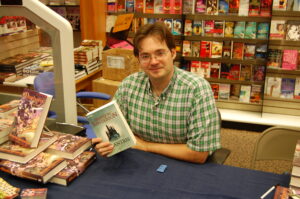by James Scott Bell
@jamesscottbell
 Want to have some fun? Write micro fiction.
Want to have some fun? Write micro fiction.
Micro fiction is a story under 500 words (some put the limit at 300, but there is no governing authority calling the shots). Flash fiction is up to 1,000 words. After that, we’re into short stories.
I love all three forms, but micro is the most fun.
First of all, it doesn’t take that long to write. You don’t have to make a major investment of creative energy (which you mostly want directed at your full-length work).
It also trains your writing muscles. It teaches you to get into a scene in medias res—in the middle of things. That, in turn, will sharpen your skill at chapter openings.
It makes you characterize immediately, primarily through dialogue, a skill every writer should have.
And the best micro story has a twist or snapper ending. That skill comes in handy not only for the end of a novel, but also for scenes and chapters as well.
Getting Ideas
There are dozens of ways to get ideas for micro fiction. A few I’ve used are:
- Writer Igniter
- Storymatic
- Reading a news item, adding a weird element, and asking “What if?” (especially good for playing with spec fiction)
- Opening a dictionary to a random page and riffing off the first noun I find
- Jokes
Writing Micro Fiction
Usually, a micro story is going to have:
- One setting
- 1-3 characters
- Action focus
- Minimal description
- Lean sentences
Take your idea spark and think about a set up, what characters might be involved, and a central conflict. For example, I just now took out two random Stroymatic cards: attention-seeker and reunited. I thought about it for five seconds and came up with: what if an attention-seeking narcissist is reunited with his high school girlfriend at the 50-year reunion, and she doesn’t remember him?
At this point I prefer to think of a possible ending, and write toward it. Of course, you can start writing and see if an ending presents itself (I call this “micro pantsing,” not to be confused with the mini-skirt craze of the 1960s).
But here’s the nice thing: whatever course you choose you will reap the benefits of writing micro fiction. And you haven’t invested a lot of time.
I can already hear a rumbling out there. It sounds like Why not use ChatGPT for all this?
Don’t.
I say this not as a Luddite; the uses of ChatGPT have been widely discussed, here and all over the place.
The reason I don’t recommend it for micro or flash fiction is that the whole purpose of these forms is to work your writer’s brain, keep it supple and creative. If you let a machine do the creating for you, you gain nothing. Indeed, your proficiency in that arena will begin to atrophy.
But it you do the work yourself, your mind will develop the capacity to do some wonderful things.
Like the other day, I was just walking through the house when an idea—unbidden and fully formed—popped into my head.
I sat right down and wrote it. Then published it to my Patreon community.
(Pause for commercial. It’s free to sign up and gain access to all my content on Patreon, and there’s no contractual commitment. So I say, give it a look risk free!)
What to do With Micro Fiction
There are places that pay for micro and flash fiction. You can check some of them out here.
My short fiction goes to Patreon, always free to my members.
I’m also thinking that in the future I might publish micro fiction to my email list.
You could also use micro fiction as a regular feature on your blog, or as a reader magnet on your website.
But again, the main benefit is what it does for you personally. And it’s fun, like doing the daily Jumble.
Here’s the micro story that came me complete. It’s 217 words.
The Confession
Bob looked at Ed. Ed looked at Bob. Bob hated the way Ed looked at him, with that penetrating gaze. They’d been walking along the beach. The day was cold and misty. Bob had stopped to pick up a piece of driftwood.
And now, with Ed’s inquiring eyes, Bob knew he couldn’t keep it in any longer.
“All right,” he said. “I’ll spill it. I have to. Just listen. Let me get it out. I did it. I killed her. I took a knife and I did it. Was it a fit of rage? I tell myself that, Ed, but I know deep down I’d been planning it for months. After I did it, I wrapped her body in plastic, I tied ropes around her and attached two cinder blocks, put her in the boat and went out beyond Anacapa Island. Right out there, I can point to the spot. And that’s where she is now. I set up an alibi, somebody to lie for me, but I can’t lie to you, Ed. I never could. So there it is. And hey, you know what? I feel better now. I really do.”
Ed just stared at him. Those eyes!
“Okay,” Bob said. “You win.”
Bob hurled the piece of driftwood into the waves.
“Fetch, boy!” Bob said.
What about you? Ever play around with micro or flash fiction?


 I love rooting around in
I love rooting around in